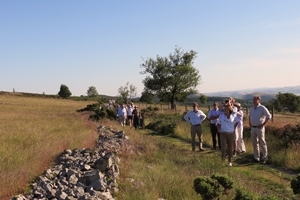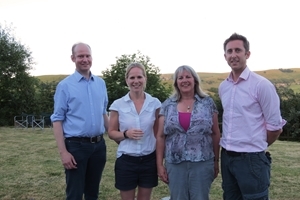 A memorable mid-summer’s evening walk on the Stiperstones was ultimately rewarded with the evocative call of curlews for members of the Shropshire branch of the Game & Wildlife Conservation Trust (GWCT).
A memorable mid-summer’s evening walk on the Stiperstones was ultimately rewarded with the evocative call of curlews for members of the Shropshire branch of the Game & Wildlife Conservation Trust (GWCT).
Led by Amanda Perkins of the Curlew Country Project, which is hosted by GWCT, and Austin Weldon, GWCT regional advisor, some 60 members walked and talked on the evening of Tuesday 26th June, hearing about the work being undertaken by the Project to engage farmers and improve the long-term survival of this red listed bird.
 Within the scheme area, which encompasses farm land in West Shropshire, bordering Wales and including the Stiperstones and Corndon Hills, the curlew population has diminished by 30% in 11 years. This dramatic decline reflects the national and international picture.
Within the scheme area, which encompasses farm land in West Shropshire, bordering Wales and including the Stiperstones and Corndon Hills, the curlew population has diminished by 30% in 11 years. This dramatic decline reflects the national and international picture.
Amanda Perkins said: “While our local curlew population is small, it is significant in comparison to tiny populations elsewhere. This is the project’s fourth year and we are now working with some 60 farmers and land managers. In 2015 and 2016, only three nests out of over 30 nests monitored survived beyond egg stage each year to hatch chicks. So in 2016, the three nests that survived predation were all surrounded by temporary electric fencing recommended to us by GWCT, one of our partners who provide technical advice.”
In 2017, the Curlew Country Project’s interventions to reduce mammalian predators included electric fencing and fox control. This resulted in many more chicks hatching successfully; however, the number of those that fledged was still very low.
Austin Weldon said: “When the chicks hatch they leave the nest after only a couple of days, in search of insects and other invertebrates to eat – species rich meadows are ideal feeding grounds. However, they are very vulnerable to predation at this time, and will travel across large areas in search of food, making them difficult to protect.”
Amanda Perkins added: “We needed to do something more so, this season (2018), we have been granted a licence to head-start curlew chicks, involving harvesting eggs from wild nests to incubate, and rear the resulting chicks that hatch until they are old enough to release into the wild. By harvesting from first clutch, birds naturally try for a second nest.”
Austin and Amanda admit that this is a steep learning curve for the project, but are hopeful that the released chicks will give a much-needed boost to the population and buy time to find solutions to the wider issues facing curlew.
The evening, sponsored by Balfours and Whittingham Riddell, concluded with supper kindly hosted by Andrew and Jane Sayer, while the curlew’s call resonated across the valley. To find out more visit www.curlewcountry.org. The Curlew Country Project is hosted by GWCT.
END
Photocaptions: (1) Around 60 people took part on the Curlew Country Project walk on the Stiperstones. (2) Amanda Perkins of the Curlew Country Project (2nd right) alongside GWCT supporters Tom Downes and Natalie and Andrew Liddiment.
Notes to editors
The Game & Wildlife Conservation Trust – providing research-led conservation for a thriving countryside. The GWCT is an independent wildlife conservation charity which has carried out scientific research into Britain’s game and wildlife since the 1930s. We advise farmers and landowners on improving wildlife habitats. We employ more than 60 post-doctoral scientists and other research staff with expertise in areas such as birds, insects, mammals, farming, fish and statistics. We undertake our own research as well as projects funded by contract and grant-aid from government and private bodies.
For information, contact:
Eleanor Williams
Telephone: 07592 025476
Email: press@gwct.org.uk